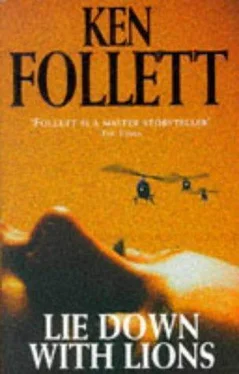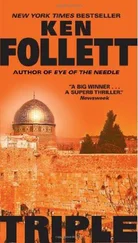Ken Follett - Lie down with lions
Здесь есть возможность читать онлайн «Ken Follett - Lie down with lions» весь текст электронной книги совершенно бесплатно (целиком полную версию без сокращений). В некоторых случаях можно слушать аудио, скачать через торрент в формате fb2 и присутствует краткое содержание. Жанр: Боевик, на английском языке. Описание произведения, (предисловие) а так же отзывы посетителей доступны на портале библиотеки ЛибКат.
- Название:Lie down with lions
- Автор:
- Жанр:
- Год:неизвестен
- ISBN:нет данных
- Рейтинг книги:4 / 5. Голосов: 1
-
Избранное:Добавить в избранное
- Отзывы:
-
Ваша оценка:
- 80
- 1
- 2
- 3
- 4
- 5
Lie down with lions: краткое содержание, описание и аннотация
Предлагаем к чтению аннотацию, описание, краткое содержание или предисловие (зависит от того, что написал сам автор книги «Lie down with lions»). Если вы не нашли необходимую информацию о книге — напишите в комментариях, мы постараемся отыскать её.
Lie down with lions — читать онлайн бесплатно полную книгу (весь текст) целиком
Ниже представлен текст книги, разбитый по страницам. Система сохранения места последней прочитанной страницы, позволяет с удобством читать онлайн бесплатно книгу «Lie down with lions», без необходимости каждый раз заново искать на чём Вы остановились. Поставьте закладку, и сможете в любой момент перейти на страницу, на которой закончили чтение.
Интервал:
Закладка:
The sense of the past was still with him, and as he looked at the khaki-colored rock walls of the gully through which he was striding, he saw scenes from his childhood alternating with nightmares about being caught by the guerrillas. His earliest memory was of the trial, and of the overwhelming sense of outrage and injustice he had felt when they had sent his Papa to jail. He could hardly read, but he could make out his father's name in the newspaper headlines. At that age—he must have been four—he did not know what it meant to be a hero of the Resistance. He knew his father was a Communist, as were his father's friends, the priest and the cobbler and the man behind the counter in the village post office; but he thought they called him Red Roland because of his ruddy complexion. When his father was convicted of treason and sentenced to five years in jail, they had told Jean-Pierre that it had to do with Uncle Abdul, a frightened brown-skinned man who had stayed in the house for several weeks, and who was from the FLN, but Jean-Pierre did not know what the FLN was and thought they meant the elephant in the zoo. The only thing he understood clearly and always believed was that the police were cruel and the judges were dishonest and the people were fooled by the newspapers.
As the years went by he understood more and suffered more and his sense of outrage grew. When he went to school the other boys said his father was a traitor. He told them that, on the contrary, his father had fought bravely and risked his life in the war, but they did not believe him. He and his mother went to live in another village for a while, but somehow the neighbors found out who they were and told their children not to play with Jean-Pierre. But the worst part was visiting the prison. His father changed visibly, becoming thin, pale and sickly; but worse man mat was to see him confined, dressed in a drab uniform, cowed and frightened, saying "Sir" to strutting bullies with truncheons. After a while the smell of the prison began to make Jean-Pierre nauseous, and he would throw up as soon as he entered its doors; and his mother stopped taking him.
It was not until Papa came out of prison that Jean-Pierre talked to him at length and finally understood it all, and saw that the injustice of what had happened was even more gross than he had thought. After the Germans invaded France the French Communists, being already organized in cells, had played a leading role in the Resistance. When the war was over his father had carried on the fight against right-wing tyranny. At that time Algeria had been a French colony. Its people were oppressed and exploited but struggling courageously for their freedom. Young Frenchmen were conscripted into the army and forced to fight against the Algerians in a cruel war in which the atrocities committed by the French Army reminded many people of the work of the Nazis. The FLN, which Jean-Pierre would always associate with the image of a mangy old elephant in a provincial zoo, was the Front de Liberation Nationale, the National Liberation Front of the Algerian people.
Jean-Pierre's father was one of 121 well-known people who signed a petition in favor of freedom for the Algerians. France was at war, and the petition was called seditious, for it might be construed as encouraging French soldiers to desert. But Papa had done worse than that: he had taken a suitcase full of money collected from French people for the FLN and had carried it across the border into Switzerland, where he had put it into a bank; and he had sheltered Uncle Abdul, who was not an uncle at all, but an Algerian wanted by the DST, the secret police.
These were the kinds of things he had done in the war against the Nazis, he had explained to Jean-Pierre. He was still fighting the same fight. The enemy had never been the Germans, just as the enemy now was not the French people: it was the capitalists, the owners of property, the rich and privileged, the ruling class who would use any means, no matter how vicious, to protect their position. They were so powerful they controlled half the world—but nevertheless there was hope for the poor, the powerless and the oppressed, for in Moscow the people ruled, and throughout the rest of the world the working class looked to the Soviet Union for help, guidance and inspiration in the battle for freedom.
As Jean-Pierre grew older the picture became tarnished, and he found out that the Soviet Union was not a workers' paradise; but he learned nothing to change his basic conviction that the Communist movement, guided from Moscow, was the only hope for the oppressed people of the world, and the only means of destroying the judges and the police and the newspapers which had so brutally betrayed his Papa.
The father had succeeded in handing the torch on to the son. And, as if he knew this, Papa had gone into a decline. He never regained his red face. He no longer went on demonstrations, organized fund-raising dances, or wrote letters to the local newspapers. He held a series of undemanding clerical jobs. He belonged to the Party, of course, and to a trade union, but he did not resume the chairmanship of committees, the taking of minutes, the preparation of agendas. He still played chess and drank anisette with the priest and the cobbler and the man who ran the village post office, but their political discussions, which had once been passionate, were now lackluster, as if the revolution for which they had worked so hard had been indefinitely postponed. Within a few years Papa died. It was only then that Jean-Pierre discovered he had contracted tuberculosis in jail, and had never recovered. They took away his freedom, they broke his spirit and they ruined his health. But the worst thing they did to him was to brand him a traitor. He was a hero who had risked his life for his fellowmen, but he died convicted of treason.
They'd regret it now, Papa, if they knew what revenge I'm taking, Jean-Pierre thought as he led his bony mare up an Afghan mountainside. Because of the intelligence I have provided, the Communists here have been able to strangle Masud's supply lines. Last winter he was unable to stockpile weapons and ammunition. This summer, instead of launching attacks on the air base and the power stations and the supply trucks on the highway, he is struggling to defend himself against government raids on his territory. Single-handedly, Papa, I have almost destroyed the effectiveness of this barbarian who wants to take his country back to the dark ages of savagery, underdevelopment and Islamic superstition.
Of course, strangling Masud's supply lines was not enough. The man was already a figure of national stature. Furthermore, he had the brains and the strength of character to graduate from rebel leader to legitimate president. He was a Tito, a De Gaulle, a Mugabe. He had to be not just neutralized, but destroyed—taken by the Russians, dead or alive.
The difficulty was that Masud moved about quickly and silently, like a deer in a forest, suddenly emerging from the undergrowth and then disappearing again just as abruptly. But Jean-Pierre was patient, and so were the Russians: there would come a time, sooner or later, when Jean-Pierre would know for certain exactly where Masud was going to be for the next twenty-four hours—perhaps if he were wounded, or planning to attend a funeral—and then Jean-Pierre would use his radio to transmit a special code, and the hawk would strike.
He wished that he could tell Jane what he was really doing here. He might even convince her that it was right. He would point out that their medical work was useless, for helping the rebels served only to perpetuate the misery of poverty and ignorance in which the people lived, and to delay the moment when the Soviet Union would be able to grab this country by the scruff of the neck, as it were, and drag it kicking and screaming into the twentieth century. She might well understand that. However, he knew instinctively that she would not forgive him for deceiving her as he had. In fact she would be enraged. He could imagine her, remorseless, implacable, proud. She would leave him immediately, the way she had left Ellis Thaler. She would be doubly furious at having been deceived in exactly the same way by two successive men.
Читать дальшеИнтервал:
Закладка:
Похожие книги на «Lie down with lions»
Представляем Вашему вниманию похожие книги на «Lie down with lions» списком для выбора. Мы отобрали схожую по названию и смыслу литературу в надежде предоставить читателям больше вариантов отыскать новые, интересные, ещё непрочитанные произведения.
Обсуждение, отзывы о книге «Lie down with lions» и просто собственные мнения читателей. Оставьте ваши комментарии, напишите, что Вы думаете о произведении, его смысле или главных героях. Укажите что конкретно понравилось, а что нет, и почему Вы так считаете.












